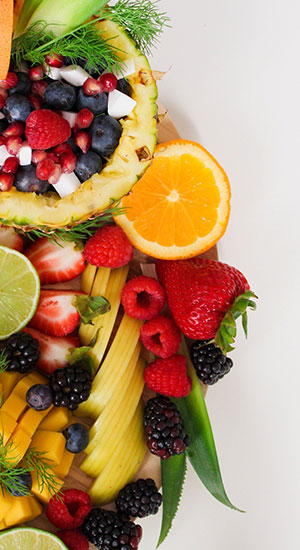Fruits and Vegetables:
- Leafy Greens: Spinach, kale, Swiss chard, and other leafy greens are packed with vitamins, minerals, and antioxidants. They are low in calories and high in fiber, making them excellent for weight management and overall health.
- Berries: Blueberries, strawberries, raspberries, and blackberries are rich in antioxidants, particularly flavonoids, which have been linked to reduced risk of chronic diseases such as heart disease and cancer.
- Citrus Fruits: Oranges, lemons, limes, and grapefruits are rich in vitamin C, which supports the immune system, promotes skin health, and aids in wound healing.
- Cruciferous Vegetables: Broccoli, cauliflower, Brussels sprouts, and cabbage are excellent sources of fiber, vitamins, and minerals. They also contain compounds that may help reduce the risk of certain cancers.
Whole Grains:
- Quinoa: Quinoa is a complete protein, meaning it contains all nine essential amino acids. It’s also high in fiber, magnesium, and antioxidants, making it a nutritious addition to any diet.
- Oats: Oats are a good source of soluble fiber, which can help lower cholesterol levels and promote heart health. They are also rich in vitamins, minerals, and antioxidants.
- Brown Rice: Brown rice is a whole grain that is higher in fiber, vitamins, and minerals compared to white rice. It provides sustained energy and can help regulate blood sugar levels.
- Whole Wheat: Opt for whole wheat bread, pasta, and flour instead of refined grains. Whole wheat products are higher in fiber and nutrients, making them a healthier choice.
Lean Protein Sources:
- Chicken Breast: Skinless, boneless chicken breast is a lean source of protein that is low in fat and calories. It provides essential amino acids needed for muscle repair and growth.
- Fish: Fatty fish like salmon, mackerel, and trout are rich in omega-3 fatty acids, which have been shown to reduce inflammation, lower blood pressure, and improve heart health.
- Legumes: Beans, lentils, and chickpeas are excellent plant-based sources of protein, fiber, vitamins, and minerals. They are also low in fat and cholesterol, making them heart-healthy choices.
- Greek Yogurt: Greek yogurt is higher in protein and lower in sugar compared to regular yogurt. It also contains probiotics, which support gut health and digestion.
Healthy Fats:
- Avocado: Avocados are rich in monounsaturated fats, which can help lower bad cholesterol levels and reduce the risk of heart disease. They also provide vitamins, minerals, and fiber.
- Nuts and Seeds: Almonds, walnuts, chia seeds, and flaxseeds are nutritious sources of healthy fats, protein, fiber, vitamins, and minerals. They can be eaten as snacks or added to salads, yogurt, or smoothies.
- Olive Oil: Extra virgin olive oil is a staple of the Mediterranean diet and is rich in monounsaturated fats and antioxidants. It’s ideal for cooking, salad dressings, and drizzling over cooked dishes.
Hydration:
- Water: Staying hydrated is essential for overall health and well-being. Water helps regulate body temperature, aids in digestion, flushes out toxins, and keeps your skin healthy.
- Herbal Teas: Herbal teas like green tea, chamomile tea, and peppermint tea are hydrating and offer various health benefits, including antioxidant properties and digestive support.
Incorporating these nutritious foods into your diet can help promote a healthy lifestyle, support overall well-being, and reduce the risk of chronic diseases. Remember to eat a variety of foods from each food group to ensure you’re getting all the nutrients your body needs.

